Apply now to join our next cohort of Community Science Fellows and Community Leads!
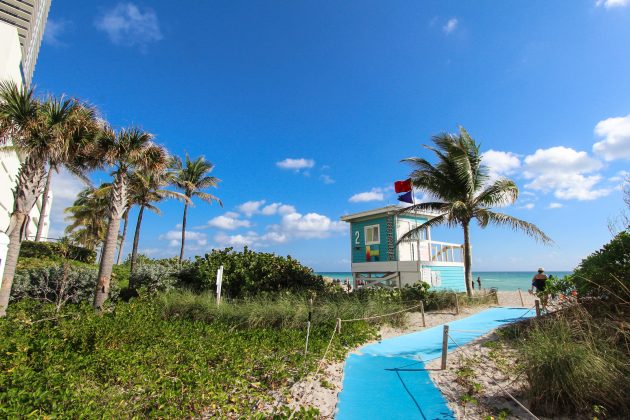
Project Title: Communicating and Acting on Climate Change
Location: Hallandale Beach, Florida
The Team:
Equip Hallandale Beach’s city staff to:
The project team met monthly via teleconference and coordinated remotely via email to plan and develop in-person workshops for city staff. This involved using Dropbox for shared document storage. Individual team members made extensive use of personal networks and systems to muster resources and support for their shared activities. This included recruiting speakers for workshops, and soliciting buy-in from city management.
This project resulted in three primary outputs:
A “Lunch and Learn” for staff focusing on climate science, integrating climate change into daily activities, and trends in public perception and action. The content and impact of this workshop was described in a June 2019 project update. The content and discussion of the workshop informed creation of the project’s second output:
A Frequently Asked Questions (FAQ) document on Climate Change. The double-sided resource breaks down and answers commonly asked questions about Climate change, specifically in the context of impact and response. It answers “What is it and how will it impact my community?” and “What can I do to reduce my carbon footprint and increase climate awareness?”
The FAQ was distributed to all Hallandale Beach staff members via email first. Subsequently, handouts were made available at meetings and workshops for staff to physically have a copy of the FAQ document. The FAQ document has also been added to the City’s Green Initiatives website and print-outs have been handed out to residents at several special events.
A full-day Climate Change staff training highlighting how climate change impacts will manifest locally, and the implications for city operations and decision-making. The day’s programming included playing USDN’s Game of Extremes (click here to download materials from USDN). Presentation topics included:
Coming out of this training, staff reported better knowledge and understanding on climate change. This is particularly useful for staff with roles characterized by face-to-face interactions with residents. For senior staff, the funding, planning and response implementation simulations in the Game of Extremes were especially illuminating.
As a result of these cumulative efforts, city staff are adequately informed about critical local impacts from climate change, and those who will need to incorporate it in their work are positioned to do so – both on a personal level and because of greater awareness of impact and jurisdiction across local government. Finally, there is greater awareness and appreciation for the expansiveness and importance of the City’s dedicated sustainability/resilience functions and staff. This may lead to greater resources for that office.
Alyssa has already scheduled two public workshops to build on and extend these conversations with the wider community. These workshops will be held as soon as public meetings are being held again in light of COVID-19, as they had previously been scheduled for mid-May.
Things that contributed to success:
Things the team might do differently if they were to do it over again:
Advice for people pursuing similar community science projects:
Hallandale Beach operates a Green Initiatives Program within its Department of Public Works to provide sustainability-related information and programs to residents and employees. Most of the City’s Green Initiatives work focuses on Water and Energy Conservation and Recycling. A main impetus for the water conservation focus includes the loss of 6 out of 8 of the City’s freshwater wells to saltwater intrusion in the past decade. In 2018, the City adopted the Sustainability Action Plan which includes short-term and long-term projects to help the City increase its sustainability and resiliency between now and 2040.
Recently, the City has begun to direct its attention to climate change and resilience. In 2011, Broward County conducted a vulnerability assessment of Hallandale Beach’s risks to one and two feet sea-level rise. In 2017, the City partnered with the South Florida Regional Planning Council to conduct a small scale vulnerability assessment which focused on potential compound flooding related to Category 1 storm surge and one and two feet of sea-level rise. Also in 2017 Hallandale Beach participated in the Resilience Dialogues to discuss local risks from with sea level rise, how to communicate with and convey these risks to stakeholders, how to address beach erosion and saltwater intrusion, and how to finance future resiliency efforts. The City is awaiting notice of award for a Florida Department of Environmental Protection grant which will facilitate the City conducting an independent vulnerability assessment of climate hazards including changes in precipitation, a larger range of sea-level rise, and extreme heat.
Hallandale Beach, Florida is a beachfront community located in Broward County Florida, just north of Miami-Dade County. It is home to a large financial district, and entertainment venues including Gulfstream Park (used for horse racing) and The Big Easy Casino. The city has a population of approximately 39,000 people and is one of the fastest growing communities in the Greater Miami Area due, in part, to its popularity among retirees. The community has large populations of Spanish, Russian, Haitian Creole, and French speakers.

Featured Image caption: L-R: Josh Papacek (University of Florida/IFAS); Ashley Smyth (University of Florida/IFAS), Colin Polsky (Florida Atlantic University); Alyssa Jones Wood (City of Hallandale Beach), Willm Martens-Habbena (University of Florida/IFAS) (Photo courtesy of City of Hallandale Beach)
The Hallandale Beach, Florida, project team achieved their first major project objective on May 8, 2019: hosting a “lunch & learn” to educate city staff about climate change. The staff workshop was planned to address a self-described lack of knowledge by city employees tasked with carrying out operations associated with the city’s climate resilience priorities.
Green Initiatives Coordinator, Alyssa Jones Wood, was joined by a panel of scientists from the University of Florida/IFAS and Florida Atlantic University: Josh Papacek, Ashley Smyth, Colin Polsky, and Willm Martens-Habbena. They used the workshop as an opportunity not only to educate staff on climate change and help them become comfortable using that knowledge when engaging with residents, but also to facilitate exploration of how climate change may or will impact their work.
When planning the workshop, the team recognized that busy schedules and different emphasis on climate change could limit participation by key individuals. So, with the support of the City Manager, it was required that each of the City’s 14 municipal department send at least one representative to the workshop. Ultimately 54 people attended the workshop, including several department heads and the City Manager himself.
A survey was distributed prior to the workshop to establish a baseline of employees’ climate change knowledge. A large number of respondents did not have any confidence in their knowledge of the role of greenhouse gases, climate science, or how they as individuals or city employees can affect (or be impacted by) climate change. In a post-workshop survey, those reservations were nearly eliminated, with responses demonstrating a shift toward strong confidence in knowledge and understanding.
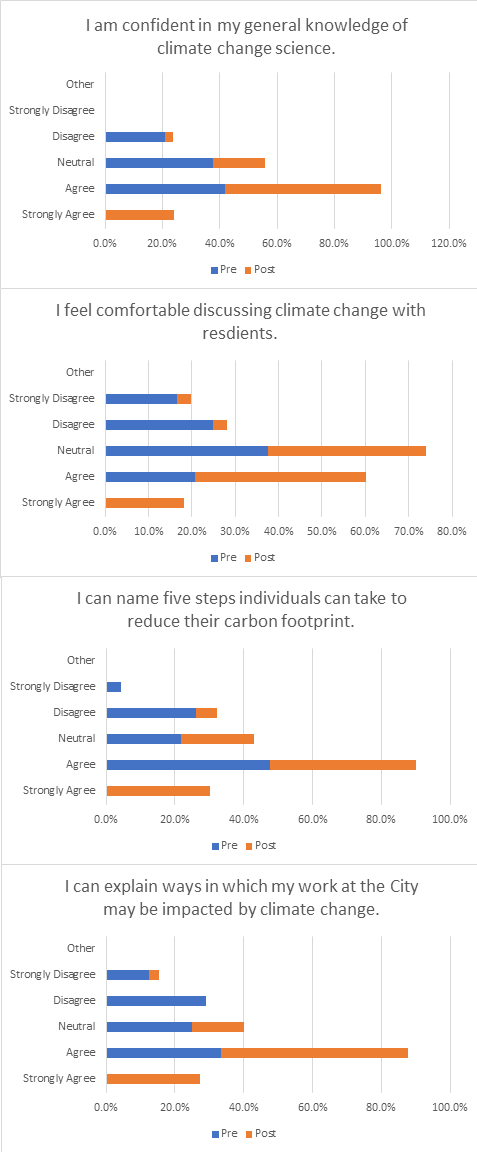
Survey results courtesy of Hallandale Beach
The workshop was structured to include brief introductory information regarding local climate impacts, integrating climate change into daily activities, and trends in public perception and action. The remainder of the time was dedicated to Q&A and discussion. The team prepared a list of questions that they could discuss in advance but found that most of the questions the participants had were different than expected. For example, the panel was asked how global warming may effect volcanoes or vice versa. Other unexpected questions included questions regarding water quality and battery waste related to electric vehicles. As a result, the information presented during the workshop was different – and ultimately more useful – than what would have been shared if the structure had emphasized presentation over interaction. The only complaint Alyssa received was that it wasn’t long enough! Staff “loved the opportunity to learn by asking questions and many of them have asked when I’m going to do this event again.” While global climate change can come across as an overwhelming or saddening issue, staff emerged from the meeting energized by learning details and how they may make a difference both personally and professionally. Many staff members have expressed a newfound interest in climate change and have begun following the topic independently.
The team is now considering a follow-up workshop – or perhaps several – that would benefit the staff further, and considering how potential alternative formats could maximize value for participants. They’re also thinking about how the content of these events can be captured to be used by future staff. In the meantime, the questions posed by City staff are being used to generate a “Frequently Asked Questions” document available in both English and Spanish that can serve as a quick reference for common questions.
Upcoming plans for this project team include workshops and engagement/outreach efforts for the general public. These activities will likely be just as informative and surprising.
Recommendations for others planning to host a similar event:
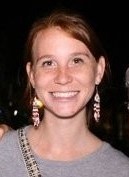
Alyssa Jones Wood is Green Initiatives Coordinator for the City of Hallandale Beach. Alyssa is the city employee who works on sustainability and resilience full-time. She implements the city’s Sustainability Action Plan, encourages residents to conserve natural resources, and makes recommendations related to climate change resiliency. She also collaborates with individuals throughout other departments and supports various initiatives to improve sustainability awareness.
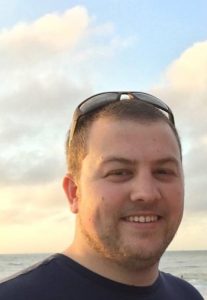
Josh Papacek is a recent PhD graduate in Soil and Water Sciences from the University of Florida. His research focused on recent declines in water quality, shifts in harmful algal bloom occurrence, and nitrogen biogeochemistry in the northern Indian River Lagoon. He is more broadly interested in the preservation and protection of wetlands and water resources. During graduate school, he also became interested in communicating science to the public and policy makers and became part of AGU’s new Voices for Science program. Josh is currently a coordinator for a higher education union in Miami, Florida but still participates in coastal and wetland science and outreach in his spare time.
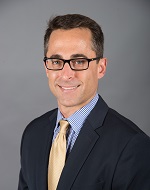
Colin Polsky is an environmental social scientist whose research and teaching examine how people create, perceive, and respond to environmental challenges. His interdisciplinary training is in mathematics, humanities, French, geography, and science & international affairs (from U. Texas, Penn State, and Harvard). As the Florida Atlantic University Center for Environmental Studies director and professor, he helps build and lead teams to advance knowledge of U.S. climate vulnerabilities, in both methodological and applied terms. His responsibilities include program building, both within and across university departments; fundraising from public and private foundations; staffing diverse and multi-generational teams; and communicating with varied audiences for both persuasive and reporting purposes.
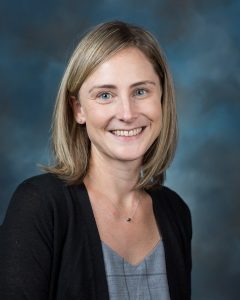
Ashley Smyth is an Assistant Professor of Biogeochemistry in the Department of Soil and Water Sciences at the Tropical Research and Education Center, University of Florida. She uses field observations and laboratory manipulation experiments to understand how environmental change and disturbance alter the physical structure and ecosystem functions of estuarine and coastal ecosystems. Her research bridges the gap between theory and application in order to increases public awareness of the environmental challenges that face South Florida. Before joining the Tropical Research and Education Center, Ashley was a postdoc at the University of Kansas and a David H. Smith Conservation Fellow at the Virginia Institute of Marine Science. She has a Ph.D. in Marine Science from the University of North Carolina at Chapel Hill.
(c) 2024 Thriving Earth Exchange